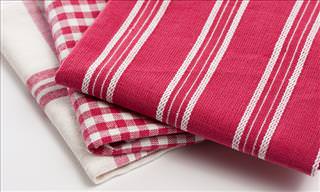We don’t tend to pay much thought to the tea towels that lie in our kitchens other than when we have to dry cutlery or crockery, but it has recently been reported that they could actually be to blame for food poisoning. Let’s take a look to see if there’s any cause for concern:
On June 9th, 2018, a poster presentation was given to the American Society of Microbiology’s annual meeting. It was based on findings from research conducted at the University of Mauritius. The researchers gave 100 tea towels to the study’s participants. Some 36 of them were a mixture of cotton and nylon, 33 were pure nylon, whereas a further 31 were made out of pure cotton.
The participants were instructed to use their tea towels for a month, then collected by the researchers so they could study the culture of bacteria that had accumulated on them. Furthermore, the participants were also asked to complete a questionnaire about their tea towel usage, diet and the size of their family. The researchers did not study whether the participants had food poisoning or other gastrointestinal illnesses.
The Results

Some 49% of the tested kitchen towels were found to have bacterial growth. Cotton towels had higher levels of bacteria than the other two types of tea towel under study. The results also showed that bacterial growth increased significantly with increased family size, especially in those with the presence of children.
In addition, the study also showed that multipurpose tea towels – those used for cleaning table and bench tops as well as the kitchen – had a higher level than “single purpose” tea towels, namely those that were used for drying hands and dishes.
One noteworthy conclusion that the researchers came to is that humid or moist towels had significantly higher concentrations of certain types of bacteria, such as coliforms. Coliforms are a class of bacteria that are found in animals’ digestive tracts, as well as those of humans. It’s also found in feces. Most coliforms are harmless, however, there are some rare strains that can cause serious illness.
Another conclusion derived from the study was that there were higher concentrations of Staphylococcus aureus (S. aureus), a common bacterium that lives on the skin, in tea towels used by families of lower socioeconomic status, families with children and larger families in general.
Coliform and S. aureus were also detected at higher rates on tea towels used by families that follow non-vegetarian diets, whereas tea towels from families following vegetarian diets were found to have higher concentrations of the Enterococcus species of bacteria.
Enterococcus is a bacteria that’s normally found in the human gastrointestinal tract, and although it usually doesn’t cause any infections, it can cause trouble for those with a weakened immune system.
Interpretation

The scaremongering that was bandied about in the US media following the presentation is seemingly just that – enterococcus and pseudomonas species of bacteria are not usually associated with food poisoning.
With that being said, it appears that the safest way to use a tea towel is to wash it after every use. That, of course, is completely impractical, but one thing that you can do to ensure that you’re not spreading bacteria all over the place is to wait for your tea towels to air-dry between uses.
Another thing you can do is to use a single tea towel for a single purpose, such as one specifically for drying the dishes, and another specifically for wiping down surfaces. You can also invest in some disposable paper towels because they’re far less likely to accumulate bacteria than tea towels are.
Content source
Images by Deposit Photos.
 Go to BabaMail
Go to BabaMail

























